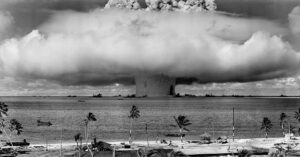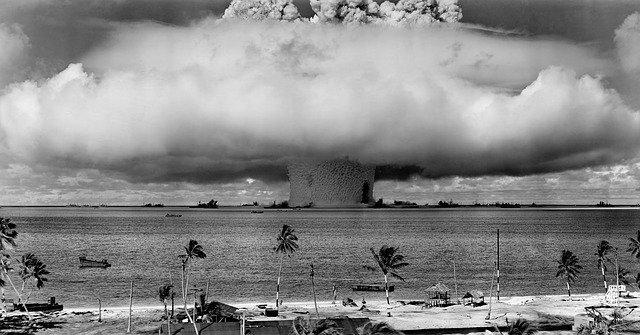
A Princeton University team constructed a computer model of what a nuclear conflict would look like today, depicting the unimaginable devastation that would occur in just a few minutes, on a global scale.
To comprehend the consequences of a single nuclear weapon on an individual city, one need only look at the destructive power of the atomic bombs dropped on Hiroshima and Nagasaki in World War II.
The devastation caused by nuclear weapons is not limited to the initial blast. In fact, the effects of a nuclear bomb can be felt for years, even decades, after it has been detonated.
The most immediate effect of a nuclear bomb is, of course, the explosion itself. The explosion can cause widespread destruction and loss of life.
What is a nuclear bomb?
A nuclear bomb is a weapon that uses the power of the atom to create an explosion. The first nuclear bomb was developed by the United States during World War II (1939-1945).
Nuclear bombs are much more powerful than conventional explosives, such as dynamite. When a nuclear bomb explodes, it releases energy that can destroy buildings, kill people, and cause other types of damage.
The destructive power of a nuclear bomb is measured in terms of its yield.
The yield is the amount of energy released by the bomb. A small nuclear bomb might have a yield of just 1 kiloton (1,000 tons) of TNT. A large nuclear bomb might have a yield of 100,000 kilotons.
Nuclear bombs can be detonated in two ways: by airburst or groundburst.
An airburst is a nuclear explosion that occurs high in the air, above the ground. A groundburst is a nuclear explosion that occurs on the ground.
The destructive power of a nuclear bomb is not limited to the initial blast.
The effects of a nuclear bomb
The effects of a nuclear bomb are not limited to the immediate blast area. A nuclear bomb can cause a firestorm that incinerates everything in its path.
The explosion and heat from a nuclear bomb can also create a massive dust cloud that can spread radioactive material over a large area.
A nuclear bomb can also cause long-term damage to the environment. The radioactive material released by a nuclear bomb can contaminate the air, water, and soil for years.
This contamination can cause cancer and other health problems in people who are exposed to it.
The effects of a nuclear bomb on the environment can last for generations. The radioactive material released by a nuclear bomb can stay in the environment for hundreds or even thousands of years.
This radioactivity can contaminate the air, water, and soil, and it can cause health problems in people who are exposed to it.
A nuclear bomb is a weapon of mass destruction. The effects of a nuclear bomb can be felt for years, even decades after it has been detonated.
A nuclear bomb can cause widespread destruction, long-term damage to the environment, and health problems in people who are exposed to it.
Nuclear bomb radius effects
The effects of a nuclear bomb depend on the size of the explosion and the type of bomb. A small nuclear bomb can cause damage to a small area, while a large nuclear bomb can cause damage to a large area.
The type of bomb also affects the radius of destruction.
A small nuclear bomb can have a radius of destruction of about 1 mile. This means that the explosion can cause damage to an area about 1 mile wide. A large nuclear bomb can have a radius of destruction of about 10 miles.
This means that the explosion can cause damage to an area about 10 miles wide.
Nuclear bombs are classified into two categories:
- Strategic
- Tactical
- Strategic nuclear bombs are designed to be used in a nuclear war. These bombs are large and can cause extensive damage to a large area.
- Tactical nuclear bombs are smaller and are designed to be used in a limited nuclear conflict. These bombs are not as powerful as strategic nuclear bombs, but they can still cause considerable damage.
What would happen if a nuclear bomb went off in space?
A nuclear bomb detonated in space would cause widespread damage to satellites and other spacecraft. The explosion would also create a massive cloud of debris that could damage or destroy other satellites.
The radiation released by the bomb could also cause problems for astronauts and other people who are in space.
A nuclear bomb detonated on the surface of the moon would cause a much larger explosion than a bomb detonated in space. This is because the explosion would be able to propagate through the denser lunar surface.
The explosion would also create a large crater and eject large amounts of debris into space.
- Read also: What Would Happen If The Sun Exploded?
- Read also: What Would Happen If Asteroid Apophis Hit Earth?
What would happen if a nuclear bomb went off in the ocean?
A nuclear bomb detonated in the ocean would cause a massive tsunami. The explosion would create a wave that could reach heights of up to 100 feet.
The tsunami would travel at speeds of up to 500 mph and could reach coastal areas within minutes. The tsunami would cause widespread damage and loss of life.
The bomb will cause a firestorm that incinerates everything in its path. The explosion and heat from the bomb can also create a massive dust cloud that can spread radioactive material over a large area.
The bottom line
A nuclear bomb is a weapon of mass destruction. The effects of a nuclear bomb can be felt for years, even decades after it has been detonated.
A nuclear bomb can cause widespread destruction, long-term damage to the environment, and health problems in people who are exposed to it.



